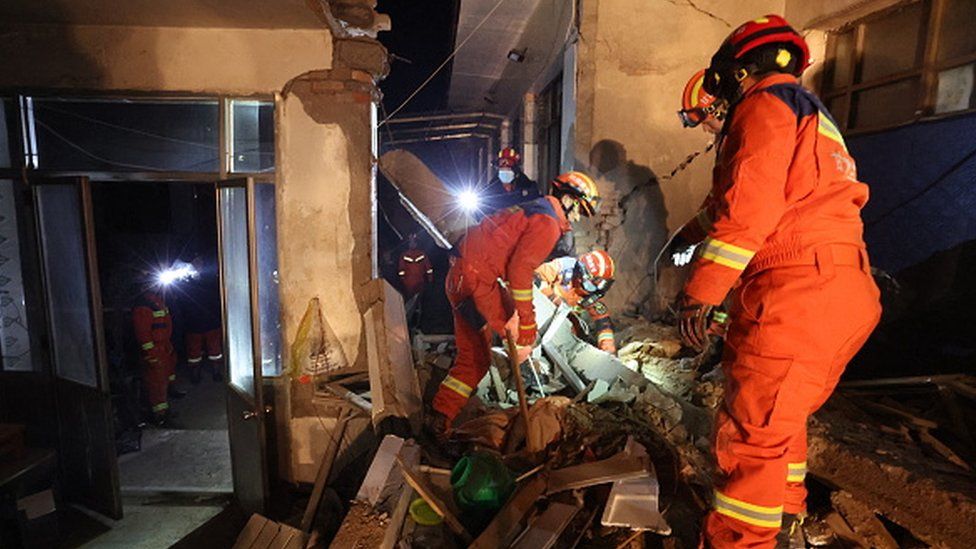57 minutes ago
About sharing
Rescue efforts for survivors of an earthquake that killed at least 131 in China’s north-west are nearly over.
Authorities on Tuesday said they were wrapping up rescue operations and would now focus on treating the injured and helping those who lost their homes.
The 6.2 magnitude quake hit Gansu province Monday night, injuring nearly 1,000 in the remote, mountainous villages.
Thousands of rescue personnel continue to work in sub-zero temperatures.
Temperatures hit -13C (8.7F) on Tuesday, Chinese media reported. Large parts of northern China are caught in a cold snap, with many cities reporting record low temperatures.
Watch moment diners sprint out of restaurant as earthquake hits
Sixteen people remain missing in neighbouring Qinghai province.
Local officials in Jishishan county, the worst-hit in Gansu province, said more than 5,000 buildings in the area had been damaged. Many other buildings in the province have been hit by mudslides triggered by the quake, while dozens of roads were damaged by landslides.
Images from the region showed entire villages split by the quake, as well as collapsed buildings and houses.
Residents who fled their homes were also shown huddling over makeshift fires at hastily erected evacuation camps.
Survivors said the tremors had felt like “being tossed by surging waves” and recalled rushing out of their apartments.
“I woke my family up and we rushed down all 16 floors in one breath,” said one man named Mr Qin by Chinese outlets.
Watch: Streets littered with debris after China quake
Monday’s quake was reported as China’s deadliest earthquake since 2014, when more than 600 people were killed by a quake in south-western Yunnan province.
Chinese President Xi Jinping ordered thousands of firemen, soldiers and policemen, as well as medical personnel, to the region, which is among the poorest and most diverse in China.
Gansu lies between the Tibetan and Loess plateaus and borders Mongolia. The remote region is one of China’s poorest and most ethnically diverse.
The epicentre of the quake was in Linxia Hui Autonomous Prefecture, home to many Chinese Muslim groups, including the Hui, Bonan, Dongxiang and Salar people.
Chinese authorities said the quake measured 6.2 on the Richter scale, while the US Geological Survey (USGS) recorded a magnitude of 5.9 and depth of 10km (6 miles). Dozens of smaller aftershocks followed the initial quake. Officials also warned of possible tremors with a magnitude of more than 5.0 in the coming days.
Officials had told the BBC on Monday they had limited time to rescue people in the sub-zero conditions.
“It is too cold to bear… it’s -15C [here],” Wang Yi, chief commander of the Blue Sky Rescue Team, told the BBC. Blue Sky is China’s largest non-governmental humanitarian organisation, with more than 30,000 volunteers across the country.
Mr Wang said he expected the number of casualties to climb. “We now need to dig deeper [into the rubble]. But there are no big buildings in the area. So it will rise, but it won’t be much,” he said.
President Xi has said “all efforts should be made to carry out search and rescue, treat the injured in a timely manner, and minimise casualties”.
China sits in a region where a number of tectonic plates – notably the Eurasian, Indian and Pacific plates – meet. It is particularly prone to earthquakes.
An earthquake in Yushu in Qinghai province, which is next to Gansu, claimed almost 2,700 lives in 2010.
China’s most devastating earthquake in recent decades was in the south-western province of Sichuan in 2008 when 87,000 people were killed.
Additional reporting by Laura Bicker in Beijing
If you are in north west China how have you been affected by the earthquake? Tell us your story by emailing: haveyoursay@bbc.co.uk.
You can also get in touch in the following ways:
WhatsApp: +44 7756 165803
Tweet: @BBC_HaveYourSay
Upload your photos/videos here
Or fill out the form below
Please read our terms & conditions and privacy policy
If you are reading this page and can’t see the form you will need to visit the mobile version of the BBC website to submit your question or comment or you can email us at HaveYourSay@bbc.co.uk. Please include your name, age and location with any submission.
Related Topics
14 hours ago
4 days ago
6 September 2022
